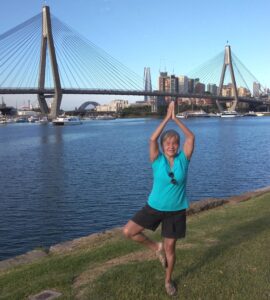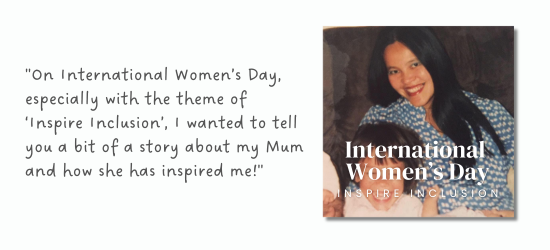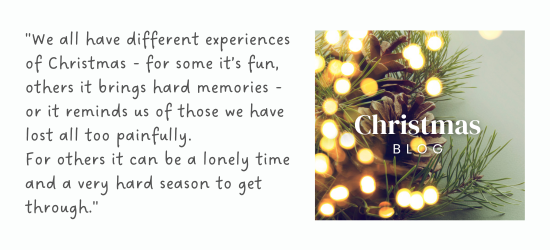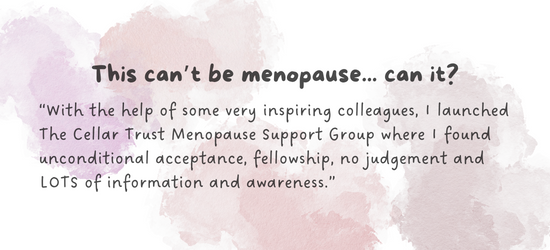World Menopause Day Blog
This can’t be menopause… can it?
Written by Sarah, Volunteer at The Cellar Trust
If you’re anything like me, a night in with your best friend, your ride or die, is one of the best forms of therapy. I’ve made some of the best decisions of my life sitting on my best mate’s sofa, in my PJs, braless, waiting for my face mask to set. If this was ‘adulting’ bring it on.
We met on our first day at high school and from that moment on we supported each other through all of life’s ‘firsts’. First kiss, first job, first baby, as well as some of the worst hangovers known to mankind. And here we were, nearly 30 years later comparing the battle scars over our favourite bottle of wine and a bar of fruit and nut. I was blessed.
But I’ll never forget one girl’s night, when I was 39 and my friend mentioned the ‘M’ word for the first time. As with all our other ‘firsts’, it is seared into my memory. We were talking about our health – how we’d both been feeling rubbish for a few months and then she said it…. MENOPAUSE.
I nearly choked on my Pinot Grigio. What? What was that? You think it might be menopause?! In my head I’m thinking ‘This is so typical of her… always wants to be first at everything’.
“Yes” she said. “I’ve had some blood tests, my GP eliminated any other causes, so its most likely my symptoms are due to perimenopause”. I went quiet, I honestly didn’t know what to say. Wow…. menopause…. But we’re not even 40 yet!
Whilst my friend regaled me with different types of HRT, I reflected on my own health. Ok so I’ve been feeling anxious more than usual, my energy has dipped, and I’ve had 3 UTIs in 3 months…. but it can’t be menopause because my periods are regular as clockwork, I’ve never had a single hot flush in my life and I’m probably tired because work is so busy. I thought back to how my mum was when she was my age. She never ever spoke about menopause, and I don’t remember her complaining about any crazy symptoms. So, feeling smug I finished the rest of the fruit and nut and told myself that menopause only happens to other people – it clearly doesn’t run in my family. Anyway, I’m far too busy for such nonsense, I’ve got a project deadline coming up and the spare room needs re-decorating.
Fast forward to my mid 40s and those very same symptoms had not only intensified but they had multiplied and unbelievably, the spare room still hadn’t been re-decorated. My superhuman ability to perfectly manage every aspect of life was fading and I couldn’t figure out what my kryptonite was.
My UTIs were now so painful and so frequent that my social life and sex life had ground to a halt. Anxiety was through the roof. My mood oscillated from crying in the car on the way to work, to incandescent rage by home time. My sense of smell was distorted (glue fumes followed me everywhere). My eyes were so dry I couldn’t wear my contact lenses anymore and don’t even get me started on the insomnia. I had watched so much sign-language TV at 3am that I could add ‘fluent in BSL’ to my LinkedIn profile.
But I really suffered at work. My ability to focus, organise, assess and make decisions had become so impeded that I dreaded my own performance reviews. My sick leave was embarrassing and even when I managed to drag myself into work I just felt as if I was in a fuzzy daze. I didn’t know how to explain my symptoms to people. I felt like I was making excuses all the time, so instead I gradually withdrew from everyone until finally at 47, I made the decision to resign from my hard earned, well paid, career. I didn’t like adulting anymore.
My 40s were a bewildering and sharp contrast to the days of my 30s, when I seemed to excel in all areas of life, effortlessly juggling home, work and social demands.
Could my symptoms really be menopause? Once again, I reviewed the facts; at 48 my menstrual cycle was as regular as ever, no hint of a hot flush or night sweat, no hairy upper lip and not a single varicose vein. That’s what I thought menopause was thanks to growing up in the 80s and 90s. That era really did a number on Generation X. Prolific sexist jokes about women in the media and in the comedy clubs (thanks a lot Chubby Brown). The last die-hard misogynists were still in the workplace refusing to retire. Outdated HR policies made menopausal women feel like an inconvenience to the workforce and the misleading health advice that HRT causes cancer left women with zero medical support. No wonder our own mothers were too confused and embarrassed to ever mention it to anyone.
Ironically it was a 25-year-old male physiotherapist who finally jolted me out of my stupor during a physio appointment for a bad case of tennis elbow (yet another meno related issue). He casually mentioned that this kind of injury happens a lot to women ‘of my age’ due to decreasing estrogen. I couldn’t believe it. No way. So, menopause really was my kryptonite this whole time and it turns out its so much more than just swapping tampons for Tenna Ladys’.
At first, I was fuming. Why hadn’t my GP ever mentioned menopause? Where was the information and awareness? And then that silent haka, the one which most women whisper every day, manifested itself in my heart; “Fine. I’ll do it myself”.
My war cry turned into a two-year mission to find out all I could about menopause. I wanted knowledge, support, treatment options and results. And that’s exactly what happened.
With the help of some very inspiring colleagues, I launched The Cellar Trust Menopause Support Group where I found unconditional acceptance, fellowship, no judgement and LOTS of information and awareness. Now at the grand age of 50 I have never been more in tune with my hormones, my reproductive system (yes, I’m still having periods) and my mental health. Awareness is empowering. I have a fresh appreciation of the unique miracles my body performs every day to help me thrive and it will continue to do so, as long as I give it the right support. It’s a symbiotic partnership. My body is not my enemy, and it never was.
Yes, menopause has its dramatic headlines like painful sex and hair loss. But there are other, less talked about symptoms to be aware of. Things like repeat UTIs or bladder inflammation, phantosmia (smelling things which aren’t really there), tendonitis (e.g. tennis elbow), dry/itchy eyes, dry mouth, nose bleeds, cold flushes, brain fog and intense feelings of ‘losing your mind’ (you are not, I promise!), dizziness and changes in body odour. Don’t discount these concerns if you notice them. This is your body gently warning you that your estrogen levels are dropping and it’s time to do something about it.
I’m so inspired by women all over the country who are speaking up, loudly, for better treatment options, increased awareness, focused workplace support and the right to express ourselves without discrimination. Think of all that we can achieve if we keep talking about it. You’ve all made such an impact on my life, and I can’t thank you enough. Without you I would never have got the spare room redecorated.
The Cellar Trust Menopause Support Group
If you have been affected by any of the symptoms mentioned here or any other issues related to menopause please join The Cellar Trust Menopause Support Group, where you will receive a warm welcome, plenty of support and lots of information.
Meetings are online, on the first Thursday or every month at 12pm-1pm and 7pm-8pm. Open to all, regardless of gender.
Please email peersupport@thecellartrust.org to register.
Other local services
You can access support for stress and anxiety from Bradford and Craven Talking Therapies – a free and confidential NHS: www.bdctalkingtherapies.nhs.uk
Find mental health and well-being support that suits you from Healthy Minds directory which covers Bradford, Airedale, Wharfdale and Craven: www.healthyminds.services
Resources
www.imsociety.org/education/world-menopause-day/
www.livehealthily.com/self-care/8-unusual-menopause-symptoms-to-look-out-for
www.purewow.com/wellness/unusual-and-lesser-known-menopause-symptoms
www.balance-menopause.com/menopause-library/10-surprising-menopause-symptoms/







